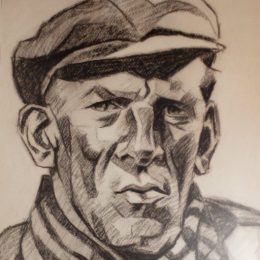
Apart from Hendrefoelan House (former home of previous blog subject Amy Dillwyn), our closest neighbour in the Hendrefoelan Student Village is the Emily Phipps Building. It has been utilized by numerous departments over the years, but visitors are often unaware of the history and significance of the eponymous woman herself.
This blog explores her life and achievements and is also a tribute to Avril Rolph, an authority on Emily’s life. Avril was a founder member of Women’s Archive Wales, and a good friend to the Miners’ Library, and we were very sorry to hear of her passing earlier this year. Avril’s career as a librarian, archivist and researcher made her an authority on feminist history and a well-respected figure in her field. She became an honorary Vice President of the Women’s Archive Wales in 2011, a reflection of her pivotal role in the organisation.
Emily Frost Phipps was born in Devon in 1865. A career as an educator was marked from a young age when she became a pupil teacher in an elementary infants school while still a student herself. Following her acceptance to Homerton Training College, Emily’s teaching career continued to flourish with increasing responsibilities and prestige. When she was appointed to Swansea’s Central Higher Grade School, the Board of Education inspectors praised it as one of the best schools in Wales, attributing its success largely to her.
Avril Rolph sourced an article in the South Wales Daily Post from 1897 which succinctly captured Emily’s impact on the school:
“Miss Phipps and her hardworking, able and conscientious staff continue to raise the character of the tone and instruction, which now reflect great credit upon all concerned.”
Teaching was not Emily’s only passion; she was also committed to political causes that furthered the rights of women. According to her biography, she joined the Women’s Freedom League in outrage at Lloyd George’s anti-suffrage behaviour at a Swansea meeting. As well as establishing a Swansea branch of the organisation, Emily gave speeches, participated in boycotts and supported numerous early feminist causes. As a member of the National Federation of Women Teachers – a pressure group within the National Union of Teachers – Emily campaigned for equal pay and became the president of the Swansea chapter in 1915. Eventually, due to a lack of support, she oversaw the separation of the NUFT as an independent union.
Emily’s life afterwards spans numerous roles and positions, all united by underlying feminist causes. She was the president of NUFT, editor of the journal Woman Teacher and, in 1925, became a barrister and the standing counsel for the National Association of Women Teachers. In 2013, a blue plaque was placed on Orchard Street in Swansea to commemorate her achievements. Avril Rolph was the main speaker at the unveiling, a testament to her expertise.
Avril’s essay, ‘Definitely not a doormat: Emily Phipps, feminist, teacher and trade unionist’ appeared in Minerva: The Swansea History Journal in 2014 and discussed key moments in Emily’s life. For instance, it reveals that she initially withdrew her application for the headteacher role in Swansea, seemingly only accepting again when her companion Clara Neal was offered a position. It also describes Emily’s census boycott in 1911, which was meant to demonstrate that if women were not considered citizens in terms of voting then they should not contribute to Government statistics. As well as providing more details about Emily’s bid to become an MP in 1918, it also contains quotations from newspaper articles and photographs of Emily throughout her life.
Such critical work has allowed Emily to be appreciated as an early feminist and, due to her relationship with Clare Neal, she is also occasionally included in histories of lesbian women. The Miners’ Library holds books about Emily (such as Deeds not Words by Hilda Kean) and books written by her: “A History of the National Union of Women Teachers“. For more information, please get in touch.
Sources
Rolph, Avril, ‘Definitely not a doorma: Emily Phipps, feminist, teacher and trade unionist’, Minerva (2014)
Kean, Hilda, ‘Emily Phipps’, Oxford Dictionary of National Biography (2008)
The National Library of Wales holds a number of newspaper clippings, as part of Welsh Newspapers Online, detailing aspects of Emily’s time at Swansea.
